Some Cli-Fi Reading Suggestions For You -- Amy Brady's new literary column at the Chicago Review of Books
UPDATE: !!!!
A reader who read Amy's article here sent us a brief note today, that read in part: "Thank you for sending me this great interview. There are books here I’m glad to know about. And I’m really glad to see Amy's new column, too. Your resolute efforts are having an effect. Because how do we get people to wake up? My way of staying hopeful is to think that if we can survive this new regime of madmen climate deniers, it will have the effect of moving us into action on a grander scale than before, hooking up all kinds of new activists and finding the links between movements.
''And I was very moved by your saying, “It’s all I do, and it’s all I think about. It’s my life now.” Yes, it has to be. One of the activist characters in the fictional trilogy I’m currently writing says (actually, my father said it first, but he wouldn’t have minded my borrowing it), “If we work all the time now and manage to stop the catastrophe, if we find the way to change course, then our children, or our children’s children, can sit in cafés and drink lattes. We don’t have time for that.”
''Not that his children listen, exactly. Well, that’s what we’re trying to figure out, in fiction and in writing about fiction – what are the mechanisms by which people can be persuaded to listen and then to act? Where is the window between “this isn’t happening” and “it’s too late now, so we may as well go dancing.”
''But you’re reminding me – I cannot begin to say how helpful this is and how deeply I appreciate it – that, as much as our activism in the streets (and in the airports and on the phones and in the elections) matters, writing about all this still matters too. We need to find the way in to people’s imaginations.
''With warm best wishes and with gratitude for your work...''
Some ‘Cli-Fi’ Reading Suggestions For You
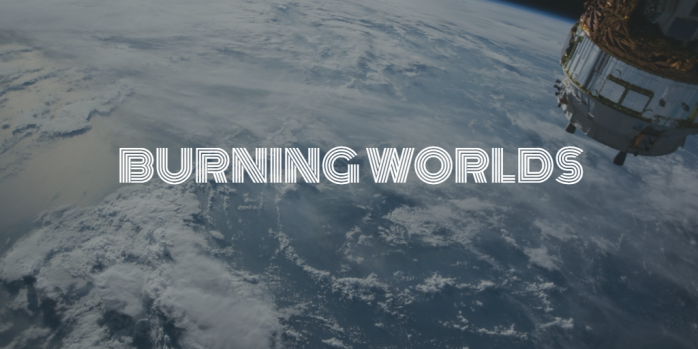
“Burning Worlds” is a new monthly column dedicated to examining important trends in climate change fiction, or “cli-fi.”
It astonishes to think just how long humans have known that the Earth is getting warmer. The term “global warming” didn’t enter public consciousness until the 1970s, but scientists have studied our planet’s natural greenhouse effect since at least the 1820s. In 1896, a Swedish chemist named Svante Arrheniussome concluded that human activity (like coal burning) contributed to the effect, warming the planet further.
And yet, here we find ourselves in 2017, still wrestling with manmade climate change like it’s a new phenomenon. Why have we not acted sooner? The answer may lie in what Indian author Amitav Ghosh calls humanity’s “great derangement”: our inability to perceive the enormity of the catastrophe that awaits us.
That’s where fiction writers come in.*
For years, authors have been writing climate change fiction, or “cli-fi,” a genre of literature that imagines the past, present, and future effects of climate change. Their work crosses literary boundaries in terms of style and content, landing on shelves marked “sci-fi” and “literary fiction.” Perhaps you’ve read one of the classics: Margaret Atwood’s Oryx and Crake or Kim Stanley Robinson’s Forty Signs of Rain. Then there’s Ian McEwan’s Solar and J. G. Ballard’s 1965 novel The Burning World, from which this column derives its name. Each of these novels—like others in the genre—help us to “see” possible futures lived out on a burning, drowning, or dying planet.
Here at the Chicago Review of Books, we feel it’s time to give cli-fi more attention. To that end, we bring you “Burning Worlds,” a new monthly column dedicated to examining what’s hot (sorry) in cli-fi. It’ll feature interviews, reviews, and analyses of the genre with the hope of generating a larger conversation about climate change and why imagined depictions of the phenomenon are vital to the literary community—and beyond.
Kicking us off is an interview with journalist and former teacher Dan Bloom, the man who coined the term “cli-fi” (read more about Bloom in his interview with Literary Hub). Bloom founded and maintains The Cli-Fi Report, the web’s most comprehensive site dedicated to cli-fi. He is a tireless crusader for the genre, a self-proclaimed “cli-fi missionary.” In this interview, we discuss what inspired his passion for climate change fiction, why he thinks the term “cli-fi” caught on, and what he recommends we all read next.
Amy Brady: You’ve had impressive careers as a journalist and a teacher and have lived around the world. Tell us more about yourself and your love for literature.
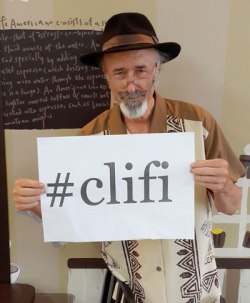 Dan Bloom: I graduated from Tufts, class of 1971, as a literature major. I studied American poetry under Maxine Kumin, read a lot of French, Russian, and Spanish lit (studied in Paris my junior year), and really wanted to be a novelist. I even wrote one! Never published it. After college, I worked in Washington D.C. as a freelance cartoonist for The New Republic, The Washington Star, and The Washington Post. In 1983, I became the fulltime editor of the “Letters to the Editor” section at The Los Angeles Herald Examiner. In the late ’80s I founded a free weekly paper in Juneau, Alaska called The Capital City Weekly, where I served as editor, reporter, humor columnist, and book reviewer. I moved to Japan in the ‘90s and worked at a paper called the Yomiuri Shimbun—I wrote for their English section as a reporter and book reviewer. Then it was on to The Taipei Times—I still freelance there.
Dan Bloom: I graduated from Tufts, class of 1971, as a literature major. I studied American poetry under Maxine Kumin, read a lot of French, Russian, and Spanish lit (studied in Paris my junior year), and really wanted to be a novelist. I even wrote one! Never published it. After college, I worked in Washington D.C. as a freelance cartoonist for The New Republic, The Washington Star, and The Washington Post. In 1983, I became the fulltime editor of the “Letters to the Editor” section at The Los Angeles Herald Examiner. In the late ’80s I founded a free weekly paper in Juneau, Alaska called The Capital City Weekly, where I served as editor, reporter, humor columnist, and book reviewer. I moved to Japan in the ‘90s and worked at a paper called the Yomiuri Shimbun—I wrote for their English section as a reporter and book reviewer. Then it was on to The Taipei Times—I still freelance there.In the early 2000s, I taught part-time as an adjunct lecturer in the Taiwanese literature and computer science departments, teaching English composition to Master’s Degree students.
Literature has always been important to me. I’ve read the New York Times Sunday Book Review every Sunday since 1964, and in college was a fan of The New York Review of Books and The Paris Review, back when George Plimpton ran it. I still read Publisher’s Weekly every week—it’s my publishing Bible.
Amy Brady: What brought your attention to climate change fiction specifically?
Dan Bloom: The 2006 report released by The Intergovernmental Panel on Climate Change (IPCC), and the powerful James Lovelock interview in The Independent in the U.K. that same year. He spoke of there being only a few people left in the arctic after global warming decimates the human population. That bit sent shivers down my spine. It was a “eureka” moment, a wake-up call.
 Amy Brady: You were the first person to coin the term “cli-fi.” What inspired you to use it, and why do you think it caught on?
Amy Brady: You were the first person to coin the term “cli-fi.” What inspired you to use it, and why do you think it caught on? Dan Bloom: “Cli-fi” came to me after I read the IPCC report and was thinking of ways to raise awareness of novels and movies about climate change issues. I toyed with using such terms as “climafic” or “climfic” or “clific”. But I wanted an even shorter term that could fit easily into newspaper and magazine headlines. So using the rhyming sounds of “sci-fi,” I decided to go with “cli-fi”.
The term started to catch on worldwide on April 20, 2013 when NPR did a five-minute radio segment about “cli-fi” with authors Nathaniel Rich (Odds Against Tomorrow) and Barbara Kingsolver (Flight Behavior). That segment reached academics, literary critics, journalists and headline writers. Why did it catch on? For one, I conducted a prolonged, daily, 24/7 P.R. campaign via Twitter and email to reach media people after the NPR story went viral to keep the momentum going. I contacted all kinds of people in the literary world. About 90 percent of them did not respond to my emails or my Tweets. But 10 percent did, including Margaret Atwood and Michiko Kakutani, and that has made all the difference.
I never give up. This is my life’s work now and has been since I first read that IPCC report. It’s all I do, and it’s all I think about. It’s my life now.
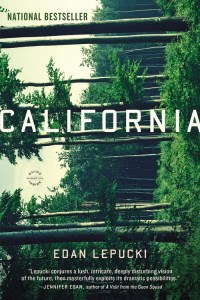 Amy Brady: Why is it important to read cli-fi?
Amy Brady: Why is it important to read cli-fi? Dan Bloom: Cli-fi serves as a wake-up call. To quote Sarah Stone, who I believe said it best in a review of Edan Lepucki’s novel California for SFGate: “If we survive—truly, and not in the unhappy ways depicted [in California]—it will be in part because of books like this one, which go beyond abstract predictions and statistics to show the moment-by-moment reality of a painful possible future, the price we may have to pay for our passionate devotion to all the wrong things.”
Amy Brady: What can cli-fi novels do that perhaps cli-fi movies can’t? Or do you think they provide a similar experience?
Dan Bloom: Both are important. Novels are often adapted into movie scripts as we see with David Mitchell’s Cloud Atlas and the forthcoming Annihilation, which is based on Jeff Vandermeer’s novel of the same name. So there is a nice relationship between novels and movies. Movies, of course, reach millions of people with powerful visual impact. But novels are also discussed widely and treat subjects with more depth.
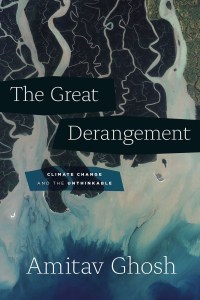 Amy Brady: What do you make of Amitav Ghosh’s recent book-length examination of cli-fi, The Great Derangement?
Amy Brady: What do you make of Amitav Ghosh’s recent book-length examination of cli-fi, The Great Derangement? Dan Bloom: I loved that book. It’s a collection of climate-themed essays from a University of Chicago lecture series, and I not only read them, I watched them on Youtube. It’s a very important book, but he got bogged down in the distinction between genre and literary fiction. Novelists today don’t care much about such intellectual distinctions. Using words to tell a good story is all that matters. Genre is only important for organizing library shelves. Truly. Story is everything.
Amy Brady: How do you envision your role in the world of cli-fi moving forward?
Dan Bloom: Me? I see myself as a cli-fi missionary, a cheerleader for novelists and screenwriters, a P.R. guy with media contacts, a literary theorist, and an advisor to novelists seeking publication advice and direction. I get personal emails from novelists wanting to know more about cli-fi and how to place their novels every week.
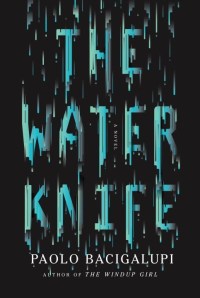 Amy Brady: What are some of your favorite cli-fi novels?
Amy Brady: What are some of your favorite cli-fi novels? Dan Bloom: Polar City Red by Jim Laughter, Finitude by Hamish McDonald, Flight Behavior by Barbara Kingsolver, The Water Knife by Paolo Bacigalupi, and Jean-Marc Ligny’s Acqua TM, a novel in French that should be translated into English. From Germany, I love EisTau by Ilija Trojanow, which was recently translated into English as The Lamentations of Zero. That book is even better than Ian McEwan’s Solar. I’m all in favor of non-English language cli-fi novels. Cli-fi, after all, is a worldwide call to action.
*It’s worth noting that in The Great Derangement Ghosh writes that he feels there’s a lack of literary response to climate change. While many people, this writer included, feel somewhat differently on this point, Ghosh’s arguments are well worth exploring further.
Dan Bloom is a 1971 graduate of Tufts University in Boston. He received his MA in Speech and Communications from Oregon State University. Bloom worked as a journalist in Alaska for 12 years and, later, as a newspaper editor and reporter at English-language newspapers in Japan and Taiwan.
UPDATE: !!!!
A reader who read Amy's article here sent us a brief note today, that read in part: "Thank you for sending me this great interview. There are books here I’m glad to know about. And I’m really glad to see Amy's new column, too. Your resolute efforts are having an effect. Because how do we get people to wake up? My way of staying hopeful is to think that if we can survive this new regime of madmen climate deniers, it will have the effect of moving us into action on a grander scale than before, hooking up all kinds of new activists and finding the links between movements.
''And I was very moved by your saying, “It’s all I do, and it’s all I think about. It’s my life now.” Yes, it has to be. One of the activist characters in the fictional trilogy I’m currently writing says (actually, my father said it first, but he wouldn’t have minded my borrowing it), “If we work all the time now and manage to stop the catastrophe, if we find the way to change course, then our children, or our children’s children, can sit in cafés and drink lattes. We don’t have time for that.”
''Not that his children listen, exactly. Well, that’s what we’re trying to figure out, in fiction and in writing about fiction – what are the mechanisms by which people can be persuaded to listen and then to act? Where is the window between “this isn’t happening” and “it’s too late now, so we may as well go dancing.”
''But you’re reminding me – I cannot begin to say how helpful this is and how deeply I appreciate it – that, as much as our activism in the streets (and in the airports and on the phones and in the elections) matters, writing about all this still matters too. We need to find the way in to people’s imaginations.
''With warm best wishes and with gratitude for your work...''
No comments:
Post a Comment